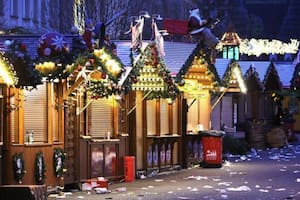
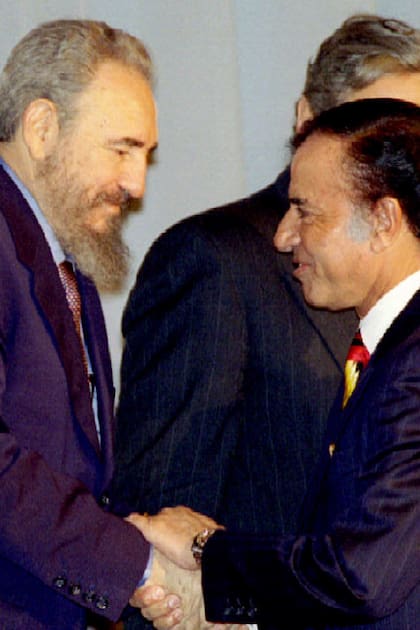
Other summits in Argentina: from the tension between Fidel Castro and Menem to the "countersummit" of Chavez and Maradona

President [Carlos] Menem told me that [Diego] Maradona made a shooting goal ... a free kick?". The Cuban leader Fidel Castro , who was no football fan, had just arrived in Bariloche on October 15, 1995. He spent a few seconds with the Argentine president and in that brief talk the Argentinian informed him that Diego Maradona had scored Boca's victory goal against Argentinos Juniors and had dedicated it especially.
The sports anecdote was a way to break the ice after several previous feuds between them. Carlos Menem was host at the V Ibero-American Summit and the media pointed out in the days prior to the meeting that the Casa Rosada's intention was to find common ground between both governments.
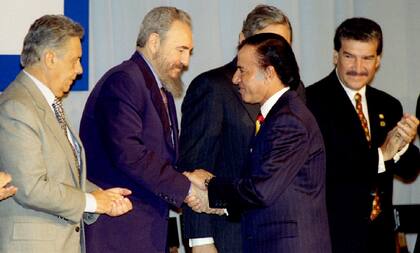
Castro was surrounded by bodyguards and was supposed to be isolated. That's why he was surprised when some journalists approached him at the PanAmerican hotel. After a first look of discomfort, he chatted politely with the press. They assured him that Menem had said he was in favor of lifting the US embargo on Cuba and thanked him: "I am very happy for the proposal, we will surely meet." The reality is that there was only an elliptical mention to the subject in the summit later. And the meeting never materialized.
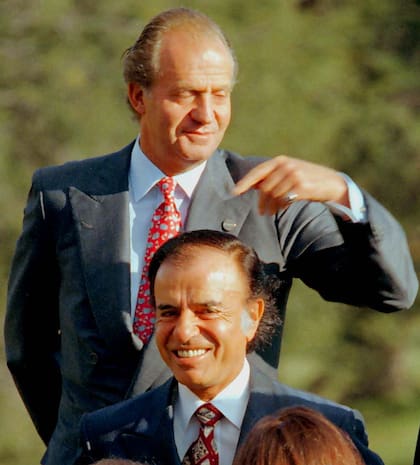
According to the diplomats who participated in the meeting, none wanted to make the decision to be the first to request the meeting. They were willing to chat, but not to take the initiative in the approach.
Menem, in his beginnings in politics, referred to Castro as the man who restored dignity in Cuba. But some time later, he adopted a very critical position and in several international meetings he said that the island would only manage to restore democracy the day Castro left power. Beyond the friendly gestures, tension dominated those days in San Carlos de Bariloche.
At that summit were present, among others, Gonzalo Sánchez de Lozada (Bolivia), Fernando Cardoso (Brazil), Ernesto Samper (Colombia), Felipe González (Spain), Alberto Fujimori (Peru) and Julio María Sanguinetti (Uruguay).
Bush, Kirchner and the attack on the IMF
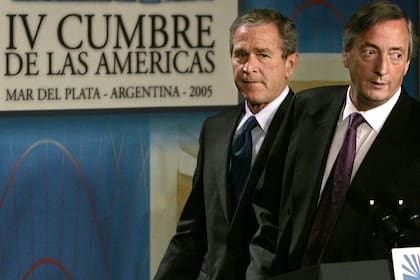
The immense security operation involved more than 22,000 local troops. In addition, about 1000 agents arrived with George Bush and many others with the Venezuelan Hugo Chavez. A-4 fighter-bombers and Pucará and Mirage planes and anti-aircraft artillery were deployed. The United States also provided Awacs aircraft to support the device. Two warships permanently patrolled the Atlantic coast.
Although the protesters never got close to the leaders of the IV Summit of the Americas of Mar del Plata, in 2005, the security forces failed to avoid incidents, both in the oceanside city and in Buenos Aires, Neuquén and Rosario. All for marches against Bush and the United States. Kirchner gave a tough speech in Mar del Plata 2005 against the IMF and the United States.
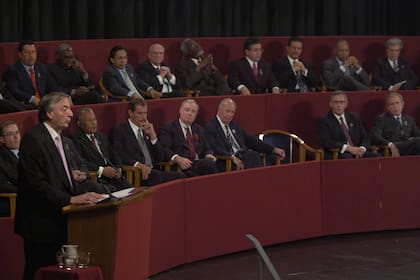
With the intention of renegotiating the debt with the IMF, the expectation of the government of Néstor Kirchner was to get a nod from Bush to intercede in the agreement. The response was lukewarm. "The United States has helped at first and now I think you can defend yourself before the IMF with a very firm hand, I congratulate you for making decisions that improved the lives of your people," the Republican president told the Argentine president.
In his speech to other presidents, the Argentine had a very tough position against the IMF and the United States regarding his participation in the economic crisis of 2001. "In a perverse gesture, the IMF gave fresh funds to a government that continued to spend. We do not ask for new loans nor do we intend to do it. For the Argentina that was running to the abyss there was help. For the country that wants to get out of the crisis fulfilling its obligations no [.] Today I was telling President Bush, the United States has an inescapable and inexcusable responsibility to end the asymmetries in the continent [.] The policies of Washington caused misery, the fall of democratic governments and situations of instability, "he complained.
A few months later, it would end up canceling the debt with the Fund in a single payment. Meanwhile, Kirchner accelerated ties with Venezuela. He signed several commercial agreements with Chávez.
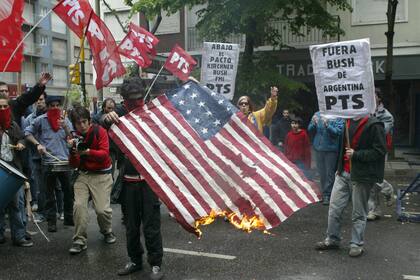
Again Maradona: "Come here, Diego!"
The counter-summit, also called the People's Summit, brought together 45,000 people at the World Cup stadium in Mar del Plata. They claimed rights for the indigenous people and expressed their rejection of the foreign debt, the Free Trade Area for the Americas (FTAA) and the militarization in South America. They promoted, in their place, the ALBA (Bolivarian Alliance for the Peoples of Our America).

Chávez, in one of his prolonged and fiery speeches, invited Maradona to say a few words. "Come here Diego! On the ALBA train, Diego Armando Maradona was a machinist!" Said the Venezuelan president, referring to the transfer from Buenos Aires to Mar del Plata. The player managed to say: "Argentina is worthy. Let's cast Bush."
It was then that the Bolivarian leader jumped with the people and launched a phrase that would remain for the story: "ALCA, ALCA, Al carajo!". The trade agreement proposed by the United States had been signed in 1994, but in Mar del Plata it was hoped to close the differences that existed to put it into operation.
During the last day of the summit, Vicente Fox, president of Mexico, said: "I propose that we start talking about commercial integration." Kirchner prevented him from continuing: "That is not the subject for which this meeting was called." And he gave the floor to another president. Bush got up to shake hands with Fox.
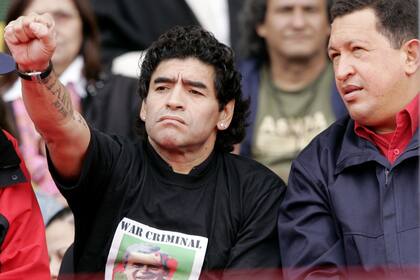
Meanwhile, the protesters clashed with the police and caused damage in Mar del Plata. The business theme was revived by Paul Martin, the Canadian premier. And Bush proposed that a proposal from Panama be discussed, which was also in favor of the FTAA. After discussions and an uncomfortable climate, the hard position of Venezuela, backed by most of the Mercosur nations, made the project fail. Bush left. He clarified that he did not do it out of anger, but out of obligation. "I want to thank him for coming and expressing my respect despite the differences," said Kirchner, who accompanied him to the exit door.
Towards the end of the day, without Bush, a document was signed, with several countries in disagreement, to resume negotiations in the future. A way to soften and disguise the hard failure of the meeting.
Back to Mar del Plata
The city of Mar del Plata once again received a meeting of leaders in December 2010: the XX Ibero-American Summit . Beyond the agenda items, the world was moved by WikiLeaks, the leaking of cables of American diplomacy. There were many absentees. Although no one officially recognized him, Chávez excused himself from participating because of the the floods in his country. Neither were Evo Morales and Raúl Castro.
José Luis Rodríguez Zapatero was absent due to the serious economic crisis in Spain. Although, in this case, there was another issue urticante: suspicions about bilateral business with Argentina. The kings Juan Carlos and Sofia were present and the Spanish Minister of Foreign Affairs, Trinidad Jiménez, made reference to the mails that linked the Spanish companies, public and private, with cases of bribery and corruption that compromised the then Secretary of Transportation, Ricardo Jaime , and they splashed the minister Julio De Vido "The Spanish companies are serious, responsible [.] What I have learned about are exchanges of emails and, in no case, lead to proof that none of the Spanish companies has committed any bribery," the chancellor assured to deny any discomfort.
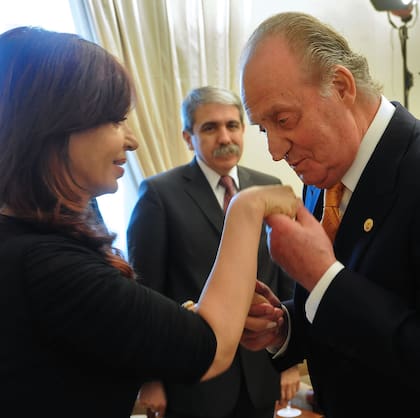
Cristina Kirchner paid tribute to Lula, who was near the end of his presidency of Brazil. And the most salient fact of the summit was that Rafael Correa, president of Ecuador, requested to push a public condemnation to the United States for the WikiLeaks case, but the position was rejected by Argentina, Brazil, Mexico and Chile.
In addition, educational goals were approved for 2021, a fund for education was created and a democratic clause was included to punish the countries in which a coup was registered.
The summits of Mercosur in Argentina
Potrero de los Funes received the Mercosur Summit in 1996, when the declaration on the Democratic Commitment was signed and joined Chile as an associated state. It was the first time that the meeting was held in Argentina.
But one of the most remembered is the 1998 meeting in Ushuaia, when for the first time the participation of a president who did not belong to the continent was allowed. It was due to the visit of the South African leader Nelson Mandela to Argentina.
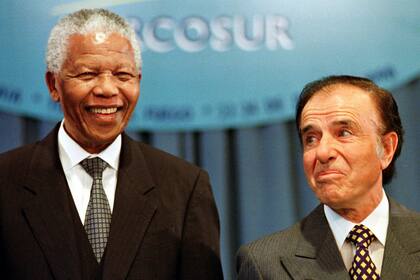
The meetings in Argentina were always important for Venezuela. In 2004, in Puerto Iguazú, it was accepted as an associate state, and in 2006, in Córdoba, it was incorporated as a full member in a Summit that had Fidel Castro as its protagonist. In addition, in 2014, in Paraná, the Summit condemned the sanctions that the United States imposed on the Venezuelan government.
But the most drastic moment was lived in Guaymallén, Mendoza, in 2017, when Mauricio Macri tried to expel Venezuela from Mercosur. However, he met opposition from Uruguayan Tabaré Vázquez and Bolivian Evo Morales. In the end, a document was issued with a warning and the decoration of the Order of General San Martín that Cristina Kirchner had given to Maduro was annulled.
A few days later, Macri was much more direct: "Venezuela must be permanently suspended from Mercosur, what is happening is unacceptable," he said of the crisis in that country. The permanent suspension took place on August 5, in São Paulo.




